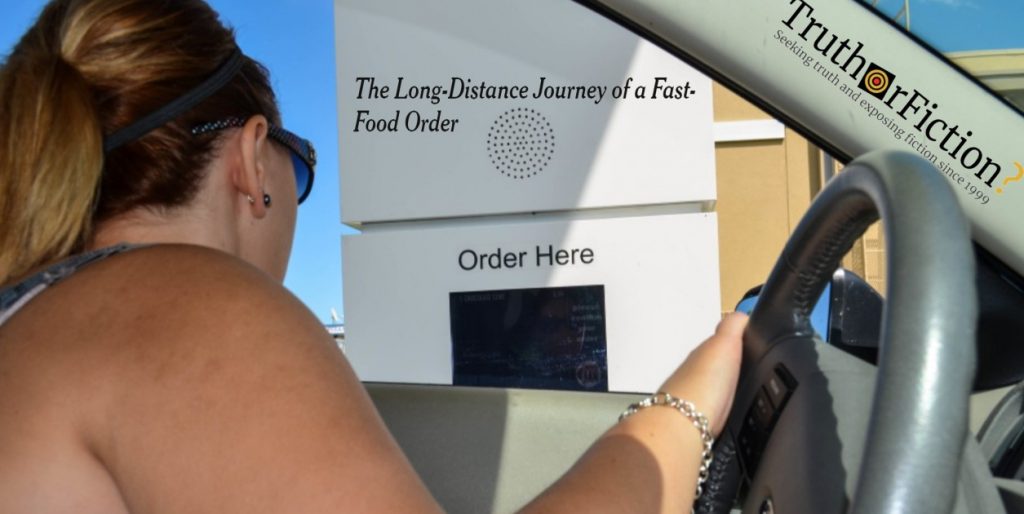While it quickly attracted attention online in April 2022, the introduction of “Virtual cashiers” in a string of grocery stores in Canada is only the latest iteration of companies testing the idea of outsourcing customer-service functions.
The Toronto Star first reported on the newest slate of remote cashiers, which were spotted at three Freshii restaurants in the province of Ontario. According to the newspaper:
Fact Check
Claim: Restaurants have been testing outsourcing cashiers for years
Description: The claim refers to the practice of companies outsourcing customer service functions, such as cashier roles, often to countries where the pay is much lower than in their native location. Most recently, this has been seen with the company Freshii testing ‘virtual cashiers’ who work from a Nicaraguan call center for less than Ontario’s minimum wage.
Unlike the Freshii workers that wrap burritos and mop floors, these “virtual” workers are nowhere near the store. Instead, at least some of them process orders from a Nicaraguan call centre nearly 6,000 km away, where they earn much less than Ontario’s minimum wage.
“Just like with Uber Eats, Skip the Dishes, self-checkout options and other emerging ordering/cashier technologies, Freshii is always looking to be an early tester and adopter of new tech solutions that might make it easier for our customers to order healthy meals and our franchise partners to run more successful restaurants,” said the restaurant chain’s chief business development officer, Paul Hughes.
While it has been contained to just a few Freshii locations, the program was quickly criticized by the Canadian Labour Council, the umbrella group for most of the country’s labor unions, which has more than 3 million members.
“Shipping jobs to an offshore location to pay less than a third of our minimum wage here is just extremely disappointing, and, quite frankly, I’m disgusted a company like Freshii would take this approach,”vice-president Bea Bruske told the Star. “We need jobs that pay taxes in Canada and that help boost our economic activity.”
The cashiers themselves are contracted through a separate company, Percy, which launched its own Twitter account after the article was published and has posted conservative talking points to respond to criticism over Freshii “testing” them:
It’s not about replacing people or jobs. It isn’t about lower pay or working conditions. It’s about a labor shortage across the restaurant industry. Most restaurants in North America offer rewarding jobs that pay above minimum wage.
Freshii operates 343 restaurants across North America, including several in the U.S. — most of those concentrated in the northeast. But the use of remote cashiers has been tested by at least two U.S.-based fast food chains for many years.
As CBS News reported in 2005, McDonald’s tested a similar initiative at some of its restaurants, using call center employees to take orders for drive-thru customers, claiming that it wanted to see if the new program would reduce errors.
“If you’re in L.A. and you hear a person … with a North Dakota accent taking your order, you’ll know what we’re up to,” then-chief executive officer Jim Skinner said at the time in a presentation.
A year later, the New York Times reported that the initiative was accompanied by surveillance of workers like 17-year-old Julissa Vargas, who worked at a California call center that took orders from 40 McDonald’s restaurants across the U.S:
Software tracks her productivity and speed, and every so often a red box pops up on her screen to test whether she is paying attention. She is expected to click on it within 1.75 seconds. In the break room, a computer screen lets employees know just how many minutes have elapsed since they left their workstations.
According to the Times, CKE Restaurants, which own’s the Hardee’s and Carl’s Jr. chains, was developing its own call-center test program.
In 2008 a third fast-food chain, Jack In The Box, tested a similar program in seven of its restaurants in North Carolina, routing customers’ drive-thru orders to a call center in Texas. The St. Paul Pioneer Press reported that the company would not reveal the results of its testing.

